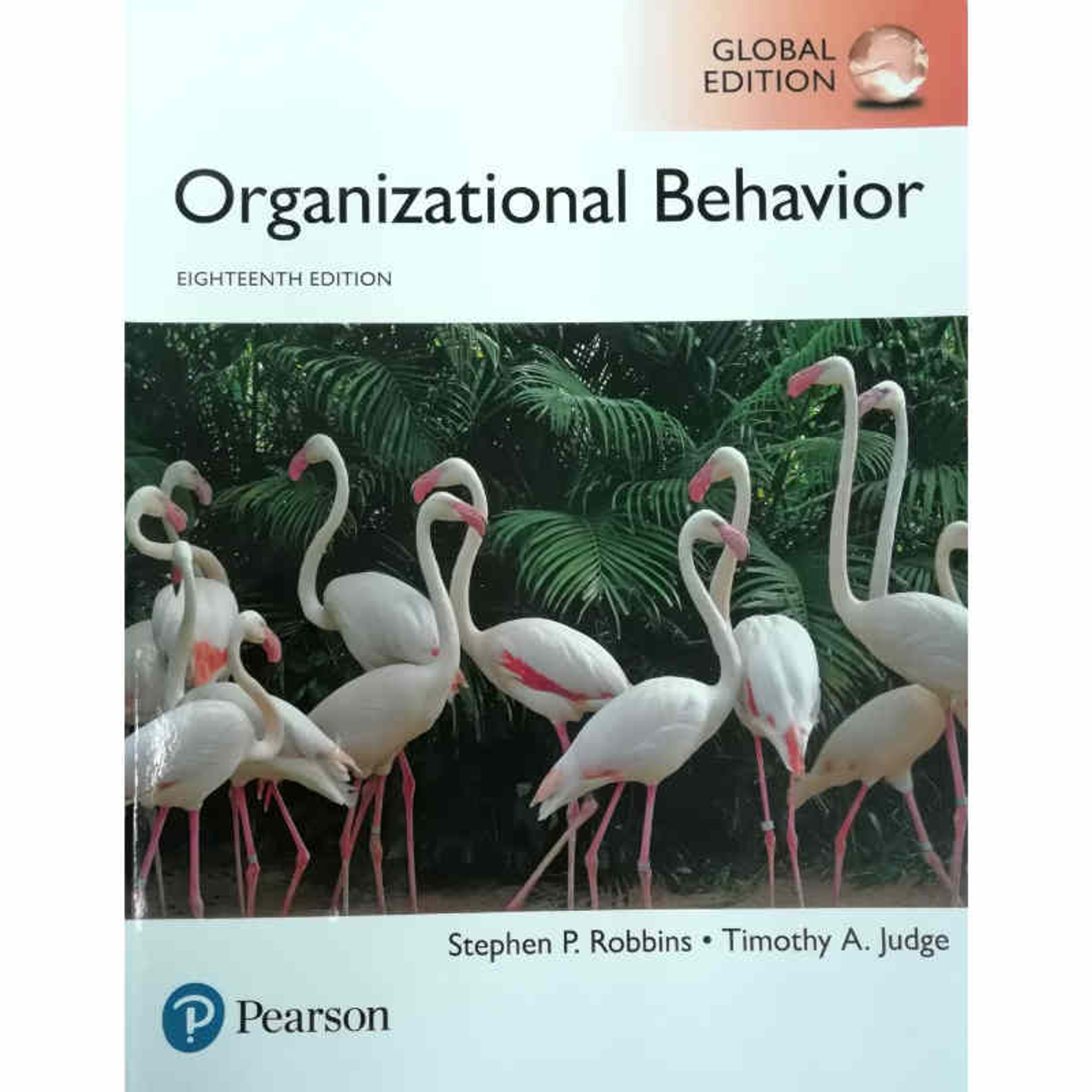Ever wonder why your coworker always seems to be so stressed, while another colleague thrives under pressure? Or why a seemingly simple task can lead to major workplace conflicts? The answers lie within the fascinating world of organizational behavior, a field that explores the complex interplay between individuals, groups, and organizations.

Image: dokumen.tips
Stephen P. Robbins’ Organizational Behavior, now in its 18th edition, is a cornerstone text for anyone serious about understanding the dynamics of human behavior in a work setting. This book provides a comprehensive framework for analyzing and influencing individual and group behavior within organizations. Whether you’re a seasoned manager, a budding entrepreneur, or simply curious about the “why” behind workplace interactions, Robbins’ work offers invaluable insights and practical tools for navigating the human side of business.
Understanding the Foundations of Organizational Behavior
Robbins’ 18th edition delves into the fundamental concepts that underpin organizational behavior, tracing its history and evolution as a discipline. It highlights the importance of studying behavior, emphasizing that individual and group actions can significantly impact organizational success.
The book examines key theoretical models, including:
- The Big Five Personality Traits: This framework explores the five core personality dimensions – Openness to Experience, Conscientiousness, Extraversion, Agreeableness, and Neuroticism – and their influence on an individual’s work behavior.
- The Myers-Briggs Type Indicator (MBTI): This widely used tool helps individuals understand their preferences for perceiving and making decisions, offering a valuable perspective on effective communication and team dynamics.
- Social Cognitive Theory: This theory emphasizes the interplay between an individual’s cognitive processes, their behavior, and their environment, providing a framework for understanding how individuals learn and adapt in the workplace.
Delving into the Dynamics of Workplace Relationships
Robbins’ 18th edition goes beyond individual attributes to explore the complex dynamics of workplace relationships. It examines the various types of groups and teams found in organizations, analyzing how social interactions, power structures, and communication styles shape group behavior and performance.
Key topics covered include:
- Teamwork and Collaboration: Robbins explores the various stages of team development, the challenges and benefits of teamwork, and effective strategies for fostering successful collaboration.
- Leadership and Motivation: The book delves into different leadership styles, examining their effectiveness in various situations. It also explores various motivational theories and their practical implications for motivating employees to achieve their best.
- Conflict Management and Negotiation: Robbins provides a comprehensive overview of conflict resolution strategies, exploring different approaches to managing conflict constructively and fostering a positive working environment.
Navigating the Challenges of Change in Organizations
In today’s rapidly evolving business landscape, organizations face constant change. Robbins’ 18th edition dedicates a significant portion to understanding and navigating the challenges of organizational change.
It examines:
- The Impact of Change on Employees: The book discusses the common emotional reactions to change, such as resistance, fear, and uncertainty, providing strategies for effectively communicating and managing change within organizations.
- Organizational Culture and Change Management: Robbins explores the role of organizational culture in driving or hindering change initiatives. He emphasizes the importance of alignment between organizational values, leadership style, and change strategies for achieving successful transformation.
- Stress Management and Work-Life Balance: In an increasingly demanding workplace, Robbins highlights the importance of stress management and work-life balance. He provides practical strategies for individuals and organizations to address stress-related issues and promote employee well-being.

Image: www.prioritytextbook.com
Embracing Ethical Considerations in Organizational Behavior
The 18th edition underscores the importance of ethical considerations in organizational behavior. Robbins examines the ethical implications of various organizational practices, such as diversity and inclusion, whistle-blowing, and corporate social responsibility.
He discusses:
- Values and Ethical Decision-Making: Robbins explores the framework of ethical decision-making, emphasizing the importance of aligning personal values with organizational values to foster an ethical environment.
- Corporate Social Responsibility and Sustainability: The book delves into the growing movement toward corporate social responsibility, highlighting the impact of organizations on society and the environment, and promoting sustainable business practices.
Utilizing the Insights of Organizational Behavior in the Real World
Robbins’ 18th edition provides a wealth of practical tools and frameworks for applying organizational behavior concepts in real-world settings. Whether you’re leading a team, managing a project, or simply navigating workplace interactions, the insights from this book can help you achieve better results.
Some key applications include:
- Effective Communication: The book provides a framework for understanding different communication styles and navigating interpersonal dynamics, enabling you to communicate more effectively and build stronger relationships.
- Conflict Resolution and Negotiation: Robbins offers a toolkit for managing conflict constructively, facilitating productive discussions, and achieving mutually beneficial outcomes.
- Team Building and Collaboration: The book provides practical strategies for fostering teamwork, building high-performing teams, and leveraging diverse talents to achieve organizational goals.
Organizational Behavior Stephen P Robbins 18th Edition Ppt
Conclusion: Expanding Your Perspective on the World of Work
Stephen P. Robbins’ Organizational Behavior, 18th edition, is more than just a textbook; it’s a comprehensive guide to understanding the human side of business. It provides a deep dive into the complexities of individual and group behavior, offering insights and strategies for navigating the challenges and opportunities of today’s dynamic work environment. By embracing the principles outlined in this book, managers, entrepreneurs, and employees alike can gain a deeper understanding of workplace dynamics, enhance their effectiveness, and contribute to a more productive and fulfilling work environment. So, if you’re ready to unlock the secrets of human behavior at work, this book is a valuable resource to help you navigate the complexities of the modern workplace.






